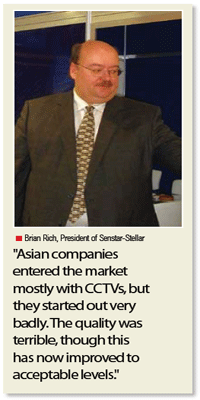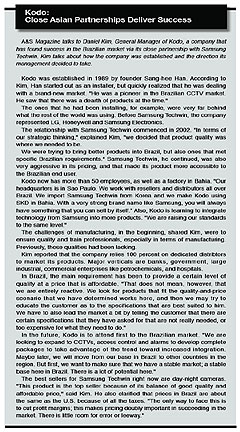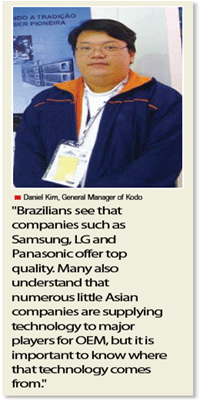Chinese, Korean and Taiwanese players have made a name for themselves around the world for their good quality-price ratios, leading to great success for OEM projects, less so for branding. Brazilians, however, also fully recognize that quality varies greatly from company to company.
Chinese, Korean and Taiwanese players have made a name for themselves around the world for their good quality-price ratios, leading to great success for OEM projects, less so for branding. Brazilians, however, also fully recognize that quality varies greatly from company to company.

While Asian players are active in the Brazilian market, Daniel Kim, General Manager of Kodo, estimates that only about 50 percent of Asian products are reliable. "Brazilians see that companies such as Samsung, LG and Panasonic offer top quality. Many also understand that numerous little Asian companies are supplying technology to major players for OEM, but it is important to know where that technology comes from. I know the companies that supply to LG and Honeywell, but for those who do not have a very strong understanding of the Asian situation, they may get unreliable quality. If they do not know these companies, then it is better not to buy directly from them."
"OEM is the only real possibility for Asian companies," said Moacyr Lombardi Jr., General Manager of Sales at HDL. "While 90 percent of all products sold in Brazil are Asian-made, they are all OEM, not branded. The U.S. or Brazilian company controls the brand and outsources to Asian manufacturers."
Sergio Mendes, owner of Sektronix, noted that Kodo does OEM work with Samsung Techwin, and that while the company has been very successful, "selling Asian brands directly in Brazil would be next to impossible. No one wants to buy anything with a Chinese name because it represents bad quality." That said, even though market research reports indicate that 50 percent of Brazil's imports come from the U.S., "We all understand that this is via manufacture in Asia," said Mendes. "Obviously, therefore, Asian manufacturing is capable of delivering good quality."
Regys de Lima, owner of Brasil Security Shop, seconded this. "While 70 percent of the products sold in Brazil are imported from the U.S., everyone knows that a lot of this is manufactured in China, Mexico and Korea. This does not mean, however, that end-users in Brazil are willing to buy brands from those countries. The brand is still a U.S. one. Asian products may be cheaper, but everyone still prefers to spend more for a U.S. brand because of the perception of better quality and also because of guarantees."
"We definitely recognize Asian players as being part of the competition," said Jason Bohrer, General Manager Americas for HID Global. "Many products are manufactured in Asia. This is true in every locale. It is even more the case in developing and emerging markets like Brazil."
Rudi Bouret Bayer, CEO of Nitrix CFTV, however, was aware of one company that was doing business directly in Brazil: Yoko. "That is the only company that I know of that has its own people in Brazil." Everfocus, he added, is also actively selling its products in Brazil, butto his knowledgeit does not have an office in Brazil.
Rather, said Bayer, "most Brazilians go to Asia to source their products; fewer Asians come to Brazil. We attend exhibitions to keep up with technological trends, and partner with Asian companies like Sharp and Sony."
Perceptions of Chinese, Korean and Taiwanese Quality
"We source many high-quality products in Taiwan, and have even set up an international procurement office there," said Bayer. "Service (after-sales and technical) is extremely important to us. When we buy from China, it is more for the low end." This is natural, he noted, because Taiwan can no longer compete with China at the low end, so it is shifting to high-end production. Despite this, "Taiwanese players are still finding it hard to compete with China, but benefit from higher quality and lower prices than Koreans." Japanese companies, he added, are not selling to Brazil anymore. "Their products are just too expensive for the market. Korean players, likewise, are also finding it hard to sell to Brazil. These two countries are able to sell only to developed markets like the U.S."
That said, international players like Pelco and Samsung dominate the industrial sector where product and service requirements are very stringent. "Here, Taiwanese players are simply unable to compete. I want to differentiate between these two markets when making my comments. The top end (through systems integrators) is held by world-class brands; Asian companies are mainly moving their product through the low- to mid-range markets (via distributors).
"For Asian players," said Eytan Dikstein, Director of Risco Group, "price is a clear advantage. They are strong in CCTVs because that is where the TV industry developed. They have a good understanding of CCTVs and cameras that has allowed them to move into other related sectors. It is funny though how different these markets are. While TV, VCR and DVR technology was about selling lots of product to major retailers at very low prices because of the fierce competition between Panasonic, Sony and JVC, on the security side, it is about selling products in far smaller volumes but at much higher profit margins."
Mendes is very happy with the quality of Taiwanese products. "They are very bright, but not as competitive as before. Now, the Chinese are really up and coming. They are very motivated and are taking over a big portion of the market. Like the U.S. and Japan before it, Taiwan is becoming too costly a place to manufacture."
Currently, 50 percent of Sektronix's products are sourced in Taiwan, 40 percent in China and 10 percent in Korea (mostly cameras, lenses and alarm sensors). "We also come to SecuTech," said Mendes, "to visit our business partners and build up the relationship to achieve a certain level of trust. We often pay upfront; so when you are going to have to wait 30 days to 40 days for something to arrive, you had better know that you can count on your partners to actually honor their deals."
After seeing the same companies year after year, Mendes now is able to negotiate better prices. "These companies also send representatives to visit us in Brazil to find out more about who we are. Email communication is easy, but it is also the preferred method of contact for many scam artists. You never really know if what they are claiming to be true, is true."
Less Impressed
"Asians are not as strong at intrusion or alarms," said Dikstein. "They are present at the low end, but they are reluctant to invest in new technology. They have a lot of patents on basic technology and are sticking with this. They are better at the manufacturing side than at technology development."
Eliane Wollmann Wedderhoff, Director of Sistemas Inteligentes Eletronicos Ltda., agreed. "Asian producers can make alarms, but they do not have the technology to manufacture GPRS systems. They also lack the requisite software. Finally, they simply cannot offer the kinds of technical support and after-sales service that are needed. The intelligent systems that we work with are definitely not a DIY market." Wollmann Wedderhoff has also found that the quality of Asian alarms is quite bad. "I have not seen much that is good, certainly nothing that I would recommend."
"We do not perceive Asian companies as being a threat," said Marcia Cesare, Vice President, GSN Brasil, "because they are targeting entirely different markets. We are at the medium to high end; they are mostly at the low end. That said, they can cause huge problems as they did when they first entered the Brazilian camera market. They dumped many products at a very low price on the market and that really disrupted everything. We focus more on technology and they are not really capable of delivering that, at least not yet. Who knows what tomorrow will bring?"
Chinese products are not of the same quality as those from Taiwan, in Lombardi's eyes. "They are low quality and many products go through unofficial channels." Korean products, he believes, are of much better quality. "These are targeted more at the mid end of the market." Korean, Chinese and Taiwanese products, however, all suffer from poor to no after-sales service. "They just replace parts."
Lombardi also finds that besides his company's strong and nation-wide technical and after-sales support, "We have a pricing advantage even though Asian products are cheap, because we manufacture in Brazil and do not have to deal with customs and shipping costs. We are legal. We offer the same prices as our competitors, despite their lower manufacturing costs and the fact that they operate outside the law. Our advantage is very strong."
"We have a large pool of customers and strong economies of scale because of this," pointed out another local player. "This makes it hard for others to compete with us. We can go as low as we have to in terms of pricing because of our huge presence."
Brian Rich, President of Senstar-Stellar Corp., however, disagrees that manufacturing in Brazil will always generate success. "Asian companies entered the market mostly with CCTVs, but they started out very badly. The quality was terrible, though this has now improved to acceptable levels. Some local companies tried to manufacture cameras, alarms and monitors in Brazil but gave up in the end. They simply could not compete with Asian companies on price."

First-time Asian Visitors to Exposec
"This is our first time to Brazil," said Frank Kung, General Manager of New Tech. "The Exposec show is good sized, and attendance has been okay. We seem to be getting lots of good business prospects, with many asking about our prices and for samples." The company was established just this year. "We wanted to enter Latin America, and Brazil seemed like the best place to start. The timing was right for us." Eventually, he hopes to move on to Argentina, Chile, Venezuela and Colombia.
"We are low to medium end. We are hoping to find distributors and contractors for customers, and I believe that our reasonable prices will attract them. At this moment, Taiwanese and Korean quality is better than ours, but I think that we are improving fast and will catch up in five years, maybe even faster. Our products are very competitive in terms of prices and we are able to offer acceptable quality. I think that we will find a niche in this area." Kung fully understands that customs, taxes and such are problems. "That is why we are hoping to find distributors. This will be their responsibility."
Kenny Kong, Sales Manger at Sunin Unitech, also reported that this was his first time to Exposec. "It is a very important show and we are making good contacts. We are looking for a distributor, regardless of whether big or small, to sell our CCTV cameras. Our target market is less about price and more about quality; we fully understand that Chinese and Taiwanese products are cheaper. Ours are mid-to high-end."
Sunin Unitech has exported to Colombia and Chile but never to Brazil. "We are also looking at Argentina. This year, we came to Brazil to check out the market. It is growing very strongly so it has potential for us." Brazilian customers, he said, recognize Korean quality as being better than Taiwanese; and, certainly, he stressed, Chinese. "They may be willing to pay extra for this quality, though we have not reached that stage of negotiations yet."
He is also trying to find good distributors. "Since this is a new market for us and, therefore, a very new experience, we are not quite sure how to go about finding a good distributor. This will take time and, initially, we are going to have to take a few chances with the partners that we meet here. We have to see if the companies that we do business with will really support us. We have been disappointed in the past with arrangements that we made in the U.S." He also said that he has no information on and little understanding of the customs, taxes and financing issues in Brazil. "We are hoping our local partners will be able to handle that."

"This is our first time to Exposec, too," said Connie Chan, Marketing Manager, at COMedia Ltd. "We are very satisfied with the show and we have found good business prospects, though we do not have any secure orders yet."
According to Chan, the company is just testing the waters in the Brazilian market. "It looks as if there are some very good prospects for business. Brazil has strong economic growth, a big population, and a booming security electronic sector. We have some clients in Brazil and are looking to expand to the rest of Latin America, including Argentina, Paraguay and Uruguay (in Mercosur) as well as Chile."
Another first-time visitor was April Baek, Export Sales Representative at Daiwon Optical Co. Ltd., though the company had been doing business with some customers in Brazil before she arrived. "We have known about Exposec for a few years, but had not attended. We have been doing business with HDLour biggest customer hereand we wanted to visit it on its own turf. We sell camera lenses and we are looking to find new customers as well as distributors."
The Korean government supports compani e s such a s Ba ek' s wi th information about the Brazilian market and its expo fairs. "We also used the same government agencies to book a place at the show, since they had bought some booths for Korean companies. At the show, we have already made contact with more than 100 companies. Out of these, I expect to get at least 10 customers. I am going to follow up on this when I get back to the office."
While Baek is quick to stress that the quality of her company's products is much better than that of Chinese companies'almost at the same level as Tamron'sit provides much lower prices. "Even though Chinese lenses are even cheaper, their quality is simply not there." Brazil, though, she noted, is a very price-sensitive market. "Our customers here keep asking us to lower our prices because the competition is so intense.
Exposec: the Right Venue for Asian Exhibitors?
While Lombardi observed that there were a number of Chinese, Taiwanese and Korean products being exhibited at Exposec, he questioned whether it was the best venue for them to showcase their wares. "Exposec is not as good for these players as ISC, which was held three weeks earlier. This year was the second ISC show in Brazil." According to him, Exposec is comprised of 80 percent to 90 percent informal companies so these products are not going through official channels. "That is the reality in Brazil. Our company is fighting against this situation."
"ISC is becoming stronger in Brazil but is still not very well known. The intent is to have a more professional show with more qualified buyers," said Dikstein. "At Exposec, the opposite is true. Here, you find many booths with companies selling detectors and sensors individually. You would never see that in a developed country. The trend is toward solutions, but the big market here is still for low-end products."
Mendes was also skeptical of the benefits of attending Exposec for Asian companies. "Entrance to Exposec is free. The buyers and visitors are, therefore, less professional." Like Lombardi, he also cited ISC. "While there are fewer exhibitors (70 or 80) compared with around 400 for Exposec, they are the biggest players. There are no international companies like Bosch and Siemens at Exposec; they all go to ISC. Nobody knows if both fairs will be able to continue; only one is going to eventually win out. Exposec is bigger than ever, but most of the people who exhibit and attend are, as I said, not very professional. ISC involves more qualified candidates who are licensed to import products."
Another question was whether the Chinese companies (most of which attend Exposec) really understand the market. "Most of the Brazilian companies who attend Exposec are not qualified; not licensed to import their products. Getting such licensing is not so easy. I guess I am trying to say there is little point in Chinese companies coming to either Exposec or even ISC for that matter. There are only 30 Brazilian companies that can legally import security products. They do not have to participate in fairs to find those companies. They can get the list and then contact them."
In Mendes' view, it is a bit ridiculous that these Chinese companies are coming here, offering their Chinese prices and talking to local players who, unknown to them, are totally confused. "These local buyers do not need to know the Chinese prices; they need to know what it will cost them here in Brazil. That means including all the import and taxes into the price. The Chinese price is totally irrelevant here. It is a real mess and a total waste of time for all concerned."
The other confusing thing for many Chinese companiesand there are not many Korean and Taiwanese companies at the showsaid Mendes, is that there is a huge and bewildering mix of importers, distributors and installers. "It is so confusing that even the security association has no idea how many players there are or how many products are being sold. That does not even take into account widespread smuggling and parallel imports."

"So, at the end of the day, all these discussions between Brazilian players and Chinese companies at Exposec are going to be for nothing. The Brazilians do not understand that they will not get the prices that the Chinese are offering because they are used to buying through licensed importers; the Chinese do not understand that the Brazilians whom they are talking to cannot actually buy their products."
Besides trying to contact these licensed importers directlyand they are usually present at international security exhibitions in Hong Kong and Taiwan, even the U.S.they should, advised Mendes, hire a good representative. "They have to find the right players who actually know the market and have good relationships with these 30 companies, so that they can actually deliver. That is precisely why I have hired a local agent in Taiwan. I figure that she is far better able to communicate with the players in Taiwan and knowsto a far greater extentwho they are and what they can deliver than me, an outsider.
How to Lose Market Share
One major problem with Chinese and Taiwanese companies, in Mendes' view, is that they got too greedy. "They thought that they could fool local players by cutting deals with a number of different, often competing, players, but they were wrong. Everyone knew what they were doing so rather than gaining new customers, they lost the ones that they had because their representatives would no longer do business with them." Once trust is lost in Brazil, players cannot recover it. "Saying you are sorry," said Mendes, "is of no use whatsoever."
The problem extends from Taiwanese and Chinese players to U.S. companies as well. "DSC," said one industry player, "used to have about 80 percent of the market for alarms in Brazil until 1990. It reorganized its management and decided to force all those who had previously been buying from it to go through only one company. The others got mad and stopped dealing with DSC. Today, the company accounts for only 5 percent to 10 percent of total sales of alarms. This represents a complete reversal of their previous market share. It would have been far better for the management to have at least asked someone in Brazil about the move first, but some clever guy in the head office thought he knew what he was doing."
Another owner of a Brazilian security electronic company was utterly contemptuous in his dismissal of Taiwanese companies. "The Koreans are difficult enough to deal with; they can be very stubborn, and quite frankly a bit racist. With the Chinese, there are quality and service issues, but we still manage to work through these. Then, there are some real cultural differences, but these problems pale in comparison to dealing with the Taiwanese."

What are these major problems? "It is utterly ridiculous how they posture, pretending to care about service issues when all they want to do is sell their products and run. When there are problems with defective merchandise (and there always are), or when you need them to provide technical support, forget it. You either cannot get a hold of them or they simply provide one excuse after another. I sense with Taiwanese more than Chinese and Koreans that they love to spout slogans. 'We care about quality' or maybe 'We strive every day for excellence' (or something equally ridiculous). But what does this really boil down to? Nothing! We still deal with them when the quality to price ratio is there, but I would just love to wipe those stupid little smiles off their faces when they make all these grandiose statements. I can almost hear them thinking 'See how smart we are fooling these stupid Brazilians.'"
The double irony, he added, is that when he offers to set them up with other companies in Brazil or provides information about the market and its requirements, there is always a level of distrust that "somehow you are trying to take advantage of them in some way."
There were compl a int s about willingness to participate financially in market research and marketing efforts as well. "The Taiwanese that we deal with talk a lot about the importance of market research and marketing efforts, but when you ask for financial support in this area, you get nothing," said one industry executive. "Generally, we go 50-50 with companies on these types of things."
If, for example, a company wants to know more about what products are selling well in Brazil, he is more than happy to send someone from his company to Asia to work closely with the employees, especially the design teams, in Taiwan. "All we ask then is that the company there makes the arrangements for the hotel and any incidental expenses. We are willing to do the same for Taiwanese who want to visit Brazil. They pay the plane ticket; we find a place for them to stay."
The result? "They wag their fingers in our faces and say 'Oh ho, you just want to send someone from your company on a free trip to Asia.' Give me a break! Do they seriously think that anyone wants to fly for hours and hours to spend even more hours visiting factories?"